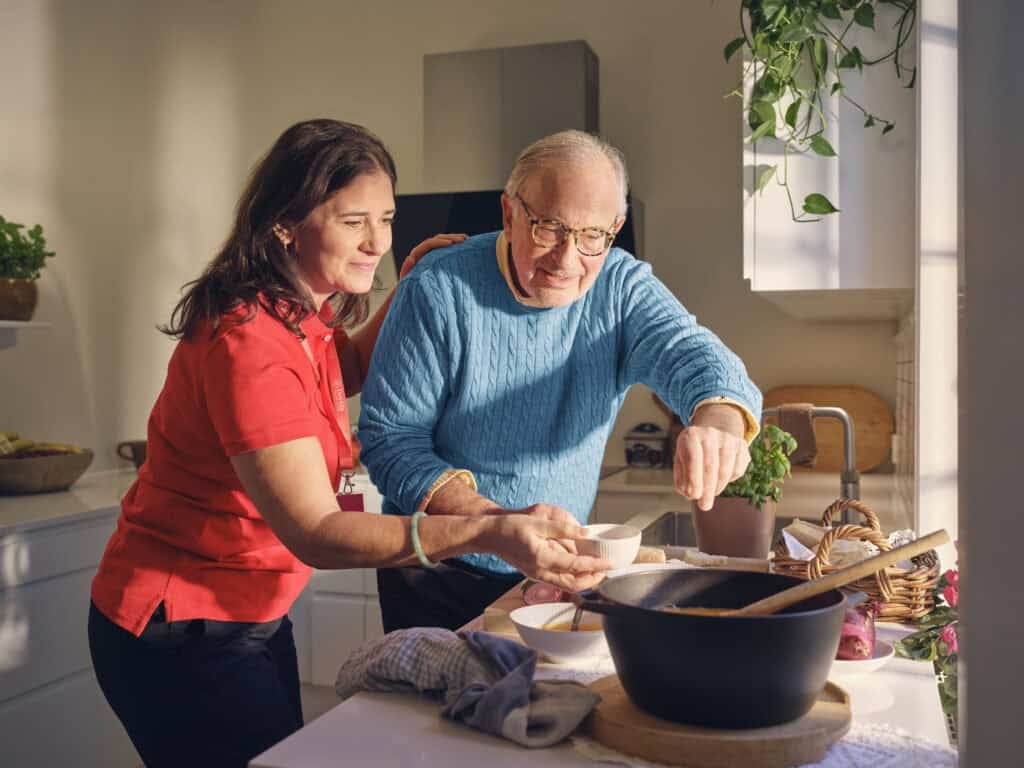Blog
2 September 2025
Creating Moments That Matter: Reminiscence and Connection in Dementia Care
While Dementia Awareness Month highlights the challenges of this condition, it’s equally important to focus on the possibilities that remain. Even as memory changes, opportunities for meaningful connection and joy persist throughout the dementia journey.
The Power of Reminiscence
Long-term memories often remain intact well into the progression of dementia, even when recent memories become elusive. This creates opportunities for connection through reminiscence activities – a person-centred approach that uses familiar objects, music, photographs, and stories to trigger positive memories and emotions.
Many families find that reminiscence activities can help reduce agitation and create moments of joy and connection. These activities create bridges between past and present, allowing families to connect with their loved ones in meaningful ways.
Simple Strategies for Everyday Connection
Creating reminiscence opportunities doesn’t require special training or expensive equipment. Some of the most powerful moments happen through simple, everyday activities:
Music and Memory: Playing songs from their youth can transport people with dementia back to happier times. Keep a playlist of their favourite tunes from when they were teenagers or young adults. Watch for physical responses – tapping feet, humming along, or simply a brightened expression.
Photo Storytelling: Looking through family albums together can spark conversations and connections. Don’t worry if they don’t remember names or details correctly – the emotions and feelings attached to these images are what matter most.
Sensory Experiences: Familiar smells, textures, and tastes can trigger powerful memories. The scent of their favourite perfume, the feeling of silk fabric, or the taste of a childhood treat can create moments of recognition and pleasure.
Routine as Comfort: Maintaining familiar routines provides security and predictability. If they always had afternoon tea at 3 PM, continue this tradition. These rituals anchor them to their identity and provide comfort in an uncertain world.
The Role of Professional Carers in Reminiscence
Trained dementia carers understand how to facilitate these meaningful moments whilst respecting each person’s unique history and preferences. They learn about their clients’ backgrounds – their careers, hobbies, family traditions, and personal interests – to create personalised reminiscence opportunities.
Professional carers also recognise when someone is having a difficult day and can adapt activities accordingly. They might switch from photo albums to gentle music, or from conversation to quiet companionship, always following the person’s lead.
Building Memory Books and Life Stories
One practical way to support reminiscence is creating a memory book or life story compilation. Include photographs, important dates, favourite recipes, and stories from different life stages. This becomes a valuable tool for both family members and professional carers, providing conversation starters and connection points.
Consider involving grandchildren in this process – they often have fresh perspectives and can help bridge generational gaps. Recording family stories, even if details become fuzzy, preserves family history whilst creating current moments of connection.
Embracing the Present While Honouring the Past
The goal of reminiscence isn’t to live in the past – it’s to use positive memories as a foundation for present enjoyment. Each successful reminiscence experience builds confidence and reinforces the person’s sense of identity and worth.
Remember that not every attempt will be successful, and that’s perfectly normal. The key is to remain flexible, patient, and focused on the emotional connection rather than factual accuracy. Sometimes the most meaningful moments happen when we simply sit together in comfortable silence, sharing presence rather than words.
During Dementia Awareness Month, consider how you can incorporate more reminiscence activities into your interactions with loved ones who have dementia. These small moments of connection can become the highlights of both your days.
